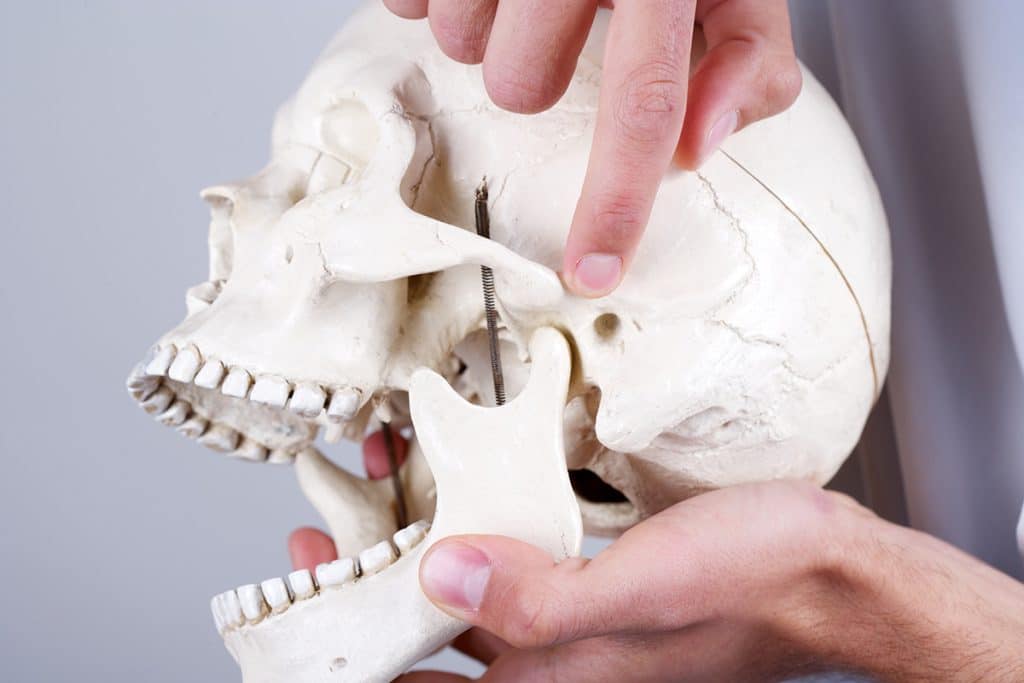What Exactly Is TMJ and What Causes It?

TMJ is a disorder affecting the jaw. It can cause pain and limited ability to open your mouth, among other symptoms. Sometimes TMJ will resolve itself, but in some cases professional treatment may be required.
What exactly is TMJ and what causes it? Learn the answer to these questions and more about TMJ disorder.
Defining TMJ Disorder
TMJ is the abbreviation for the temporomandibular joint, the location on each side of the face where the lower jaw connects to your skull. If you place your fingers in front of the opening to your ears and open and close your mouth, you will feel your TMJ working.
TMJ disorder occurs when one or both of these joints become irritated or inflamed. Swelling and tension in the muscles may restrict the movement of your jaw and cause pain when chewing or talking.
Causes of TMJ Disorder
TMJ disorder may occur due to a variety of causes:
- Teeth grinding. If you grind your teeth at night you may experience frequent jaw pain that is likely to progress to TMJ disorder.
- Eating hard or chewy foods. Chewing foods that are hard or particularly chewy can put excess strain on your jaw and may lead to TMJ disorder.
- Chewing or biting non-food items. Chewing pens and pencils, removing tags, or opening things with your teeth can cause TMJ disorder.
- Trauma to the jaw or face. A blow to the jaw or the side of the face could cause misalignment of the joints, resulting in TMJ disorder.
- Bite misalignment. If you have any type of orthodontic bite misalignment, such as an overbite, underbite, cross bite, or open bite you are at a high risk of developing TMJ disorder because your teeth don’t meet together properly.
- Arthritis. Arthritis is a condition causing inflammation of the joints, which can also affect the TMJ.
- Auto-immune disorders. Some auto-immune disorders cause joint inflammation, which can result in TMJ disorder.
Symptoms of TMJ Disorder
TMJ disorder is characterized by any combination of the following symptoms:
- Pain in the jaw
- Pain or tension in the facial muscles
- Neck pain or tension
- Headaches, especially in the temple region
- Limited range of motion in the jaw
- Popping or clicking sound when chewing or moving your jaw
- Swelling around the sides of the face
- Ear pain
- Locked jaw (inability to open your mouth)
Treatment for TMJ Disorder
If you experience any of the above symptoms of TMJ disorder, treatment options include:
- Self care. At the first signs of TMJ disorder, you can start self treatment at home. Apply ice to the sides of your face and jaw. Rest your jaw as much as possible by eating soft foods and avoiding unnecessary movement of your jaw. Take anti-inflammatory pain medication to reduce discomfort and inflammation.
- Professional treatment. If the above self care remedies do not provide relief within a few days to a week, it is time to seek professional treatment. Your dentist can provide you with a night guard, bite splint, or other oral appliance to relieve the tension and encourage proper jaw alignment. There are also physical therapy exercises you can do to get relief of your TMJ symptoms and prevent future flare ups.
- Orthodontic treatment. Orthodontic treatment can correct bite misalignment and provide relief for TMJ disorder.
- Surgery. For severe cases that do not improve with all other forms of treatment may require surgical correction.
Frequently Asked Questions About TMJ Disorder
Why does TMJ disorder cause ear pain?
It is common for someone with TMJ disorder to mistake their condition for an ear infection. This is because the joints are so close to the ear that the pain often resonates in the ear canal. The best way to tell the difference is to determine if you have any other symptoms of TMJ disorder that would not apply to an ear infection.
Is there a permanent cure for TMJ disorder?
When the cause of the symptoms is addressed, such as preventing teeth grinding by wearing a night guard or correcting bite misalignment with a bite splint or orthodontic treatment, these can provide a permanent cure for TMJ disorder.
Do You Have TMJ Disorder?
If you think you may have TMJ disorder, contact the experts at Hewlett Dental Excellence. We specialize in the diagnosis and treatment of TMJ disorder, providing long term relief of your symptoms so you can avoid flare ups in the future.
Call 516-569-5566 or contact us today to learn more and schedule an appointment.
